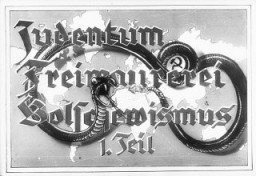You searched for: %EC%8B%A4%EC%8B%9C%EA%B0%84%EB%B0%94%EC%B9%B4%EB%9D%BC%EC%82%AC%EC%9D%B4%ED%8A%B8%7CE49.Top%7C%ED%95%B4%EC%99%B8%EC%B9%B4%EC%A7%80%EB%85%B8%20%EC%88%9C%EC%9C%84%7C%EC%97%90%EB%B3%BC%EB%A3%A8%EC%85%98%EC%B9%B4%EC%A7%80%EB%85%B8%20%EB%B3%B8%EC%82%AC%7C%EC%98%A8%EB%9D%BC%EC%9D%B8%EC%8A%AC%EB%A1%AF%EC%82%AC%EC%9D%B4%ED%8A%B8%7Coizi
<< Previous | Displaying results 471-480 of 529 for "%EC%8B%A4%EC%8B%9C%EA%B0%84%EB%B0%94%EC%B9%B4%EB%9D%BC%EC%82%AC%EC%9D%B4%ED%8A%B8%7CE49.Top%7C%ED%95%B4%EC%99%B8%EC%B9%B4%EC%A7%80%EB%85%B8%20%EC%88%9C%EC%9C%84%7C%EC%97%90%EB%B3%BC%EB%A3%A8%EC%85%98%EC%B9%B4%EC%A7%80%EB%85%B8%20%EB%B3%B8%EC%82%AC%7C%EC%98%A8%EB%9D%BC%EC%9D%B8%EC%8A%AC%EB%A1%AF%EC%82%AC%EC%9D%B4%ED%8A%B8%7Coizi" | Next >>
-
David Stoliar describes holding onto a piece of wreckage from the deck of the torpedoed Struma
Oral HistoryIn 1936, David moved to Bucharest to live with his father. As Romania came under German influence, Romanian authorities introduced increasingly harsh measures against Jews. Antisemitic agitation increased and Jews came under attack in the streets of Bucharest and in other public places. David's father decided David should leave the country and arranged passage for him to Palestine. In December 1941, David left Romania from Constanta, a port city on the Black Sea, on the Struma, an old cattle boat. The…
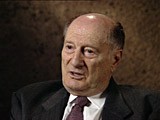
-
Helen Lebowitz Goldkind describes German humiliation of her grandfather in the Uzhgorod ghetto
Oral HistoryIn 1938-39, Hungary annexed the area of Czechoslovakia in which Helen lived. After Germany occupied Hungary in 1944, Helen and her family were deported to the Uzhgorod ghetto. As Jews, they were soon transferred to various camps, where much of the family perished. Although at times Helen was too weak to walk, she and her older sister survived Auschwitz, forced labor at a camp munitions factory, and Bergen-Belsen.
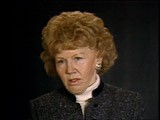
-
Fred Deutsch describes conditions in hiding place in forest
Oral HistoryFred was born in Czechoslovakia in a town near the Polish border. Fred and his family were forced by the Germans to relocate east to a town bordering Slovakia. At the end of 1942, they escaped from the town and went into hiding. The family hid in bunkers in the forest until the end of the war. They moved every few weeks to avoid detection by the Germans or Slovak authorities. While the family was in hiding, Fred's grandfather made arrangements for Fred to attend school under an assumed name and religion. A…
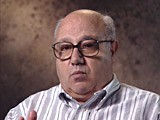
-
Sam Itzkowitz describes a death march from Landsberg, a subcamp of Dachau, to the Bavarian Alps
Oral HistoryThe Germans invaded Poland in September 1939. When Makow was occupied, Sam fled to Soviet territory. He returned to Makow for provisions, but was forced to remain in the ghetto. In 1942, he was deported to Auschwitz. As the Soviet army advanced in 1944, Sam and other prisoners were sent to camps in Germany. The inmates were put on a death march early in 1945. American forces liberated Sam after he escaped during a bombing raid.
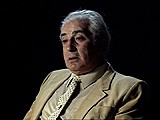
-
Boleslaw Brodecki describes hangings in a labor camp and their impact on the prisoners
Oral HistoryBoleslaw and his older sister were raised in a Jewish section of Warsaw. The Germans attacked Warsaw in September 1939. Boleslaw's father did not want to leave his ill relatives behind, so Boleslaw and his sister escaped on a train heading for the Soviet border. The Germans invaded Soviet territories in 1941, and in 1942 Boleslaw was imprisoned in a forced-labor camp. He was deported to the Theresienstadt ghetto, where he was liberated by Soviet forces in 1945.
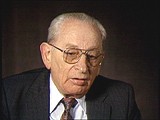
-
US veteran Raymond Buch describes forcing civilians to bury the dead
Oral HistoryAs a US Army sergeant, Raymond fought in the Battle of the Bulge. In May 1945, his unit was deployed to the Mauthausen camp in Austria to bulldoze mass graves for the victims. He watched as German civilians, on US orders, hauled bodies to the mass graves. He also saw stronger camp survivors pull clothes off their weaker counterparts to replace their own tattered uniforms. Raymond went on to Mauthausen's Ebensee camp and Gusen, guarding SS men.
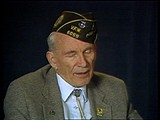
-
US veteran Tarmo Holma describes encountering camp survivors
Oral HistoryTarmo Holma is a veteran of the 11th Armored Division. During the invasion of German-held Austria, in May 1945 the 11th Armored (the "Thunderbolt" division) overran two of the largest Nazi concentration camps in the country: Mauthausen and Gusen.
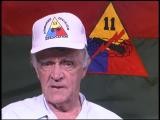
-
Lilly Appelbaum Malnik describes death march from Auschwitz to Bergen-Belsen
Oral HistoryGermany invaded Belgium in May 1940. After the Germans seized her mother, sister, and brother, Lilly went into hiding. With the help of friends and family, Lilly hid her Jewish identity for two years. But, in 1944, Lilly was denounced by some Belgians and deported to Auschwitz-Birkenau via the Mechelen camp. After a death march from Auschwitz, Lilly was liberated at Bergen-Belsen by British forces.
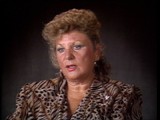
-
Samuel Gruber describes public hangings and beatings in the Lublin-Lipowa camp
Oral HistoryA Polish soldier, Samuel was wounded in action and taken by Germany as a prisoner of war. As the war continued, he and other Jewish prisoners received increasingly harsh treatment. Among the camps in which he was interned was Lublin-Lipowa, where he was among those forced to build the Majdanek concentration camp. In 1942, he escaped from the Germans, spending the rest of the war as the leader of an armed partisan group.
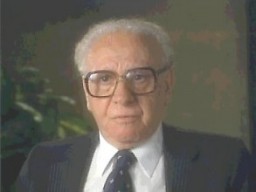
-
Freemasonry under the Nazi Regime
ArticleNazi propaganda linked Jews and Freemasons and claimed there was a “Jewish-Masonic” conspiracy. Learn more about Freemasonry under the Nazi regime.
